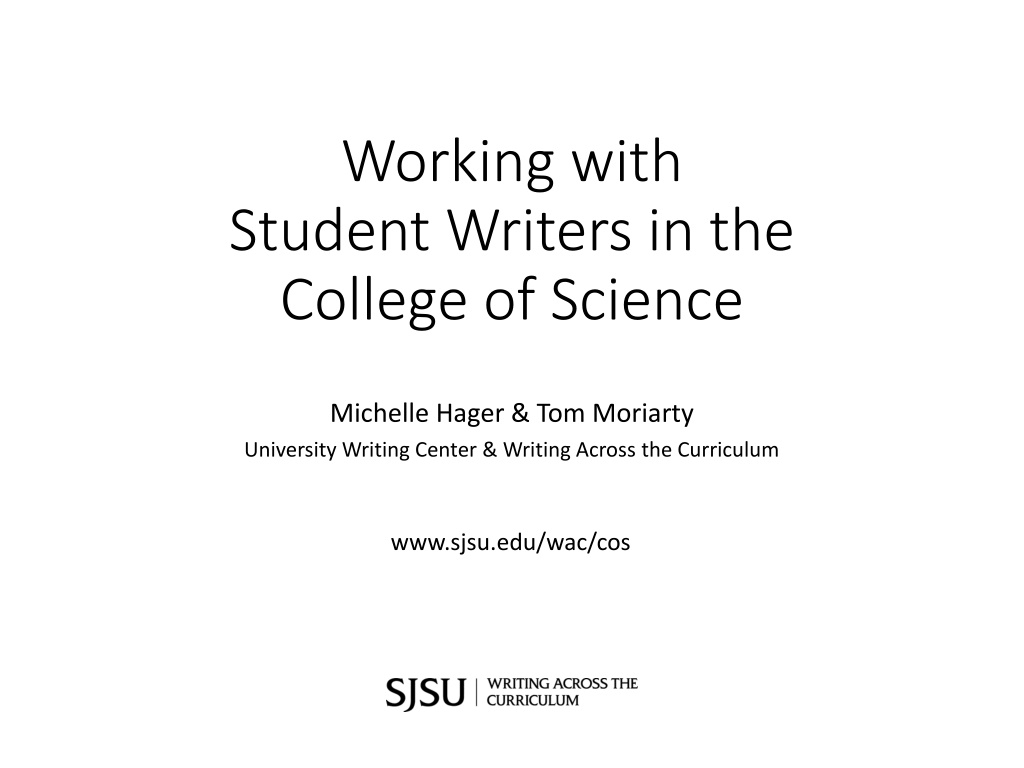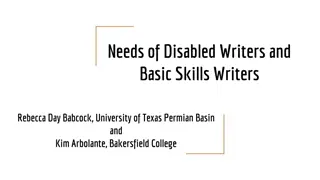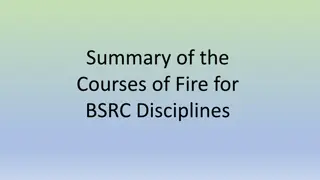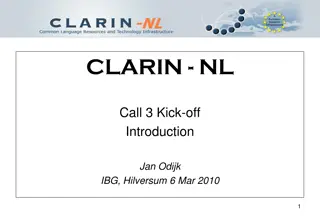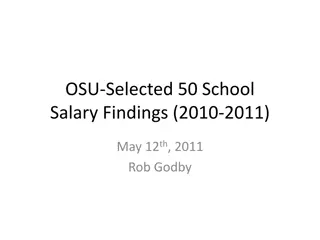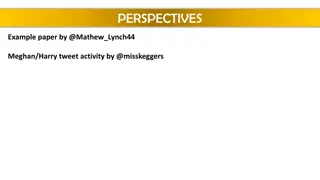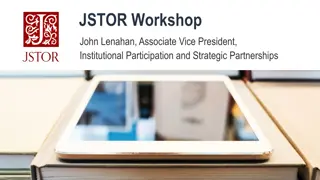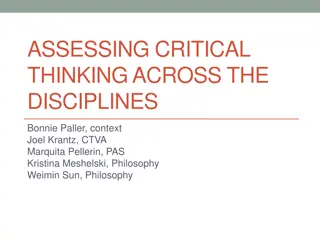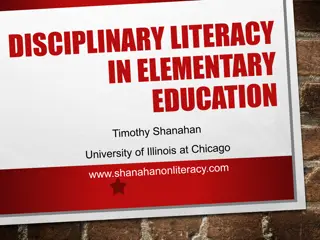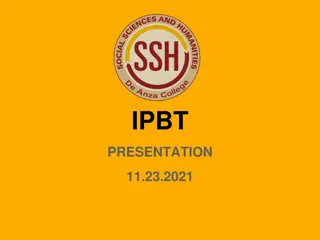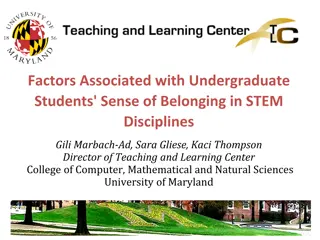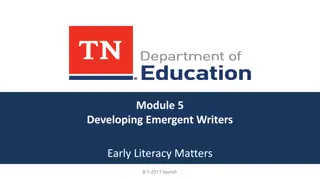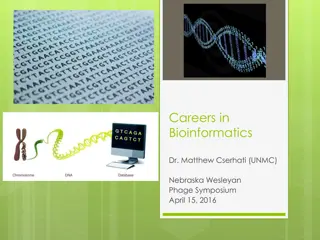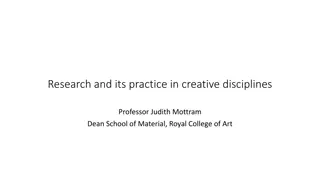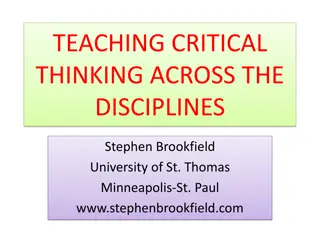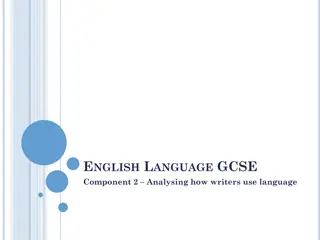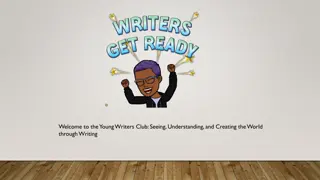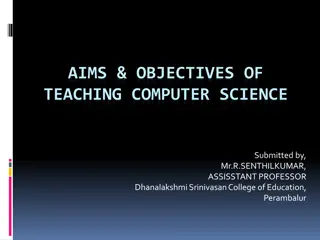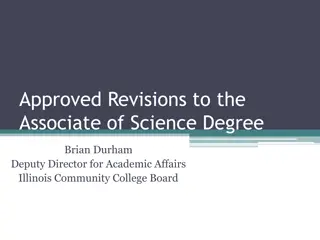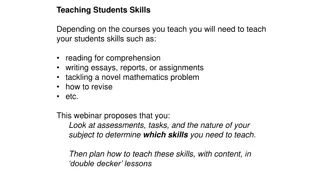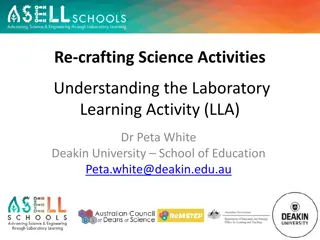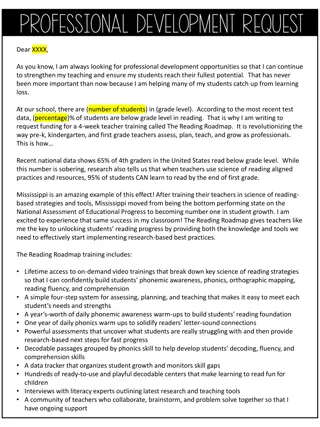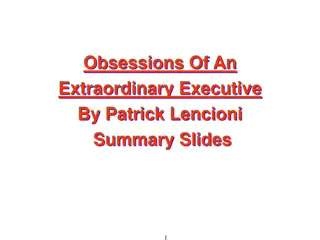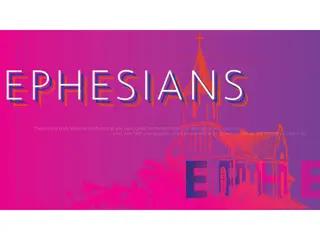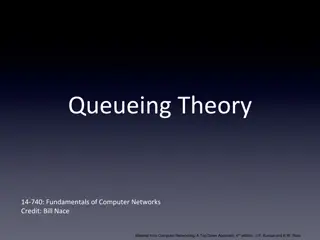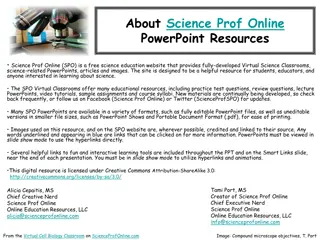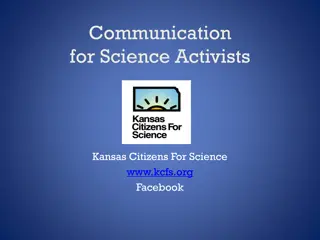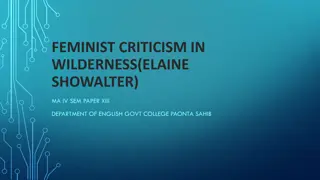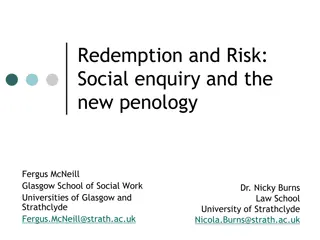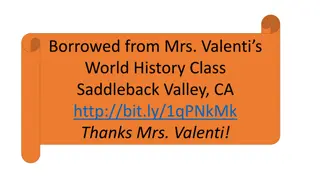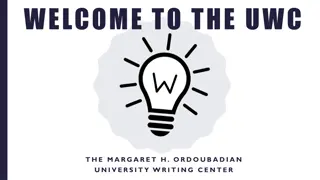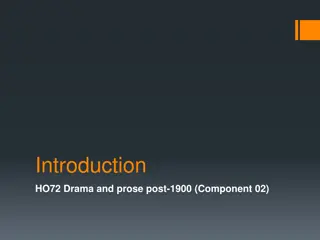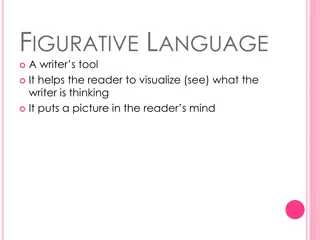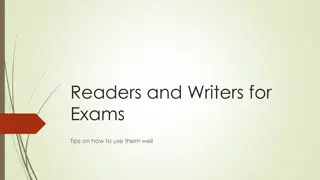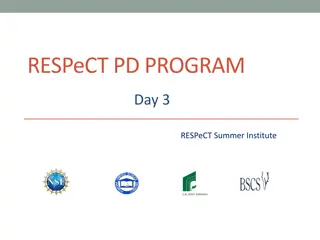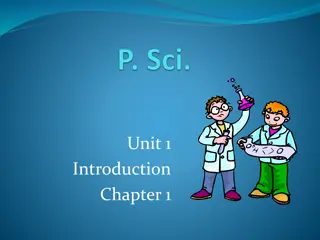Enhancing Student Writers' Skills in Science Disciplines
Student writers in the College of Science may struggle with transferring writing skills to new contexts. This article explores why writers forget and provides strategies for teachers to assist students in mastering unique writing genres within science disciplines.
Download Presentation

Please find below an Image/Link to download the presentation.
The content on the website is provided AS IS for your information and personal use only. It may not be sold, licensed, or shared on other websites without obtaining consent from the author. Download presentation by click this link. If you encounter any issues during the download, it is possible that the publisher has removed the file from their server.
E N D
Presentation Transcript
Working with Student Writers in the College of Science Michelle Hager & Tom Moriarty University Writing Center & Writing Across the Curriculum www.sjsu.edu/wac/cos
Bad News Uh oh
There is No Writing Pill No grammar shot. And writers seem to forget much of what they ve learned much of what they might be good at when faced with new and challenging writing tasks. Especially when they move from their 1st-Year Writing courses to writing in their disciplines.
Why Do They Forget? Transfer of Writing Skills Writers need cues and reminders to activate previous writing skills and apply them to new contexts. And every new context requires some new skills, too. So no writer will ever come to your class fully prepared and ready to go. Ever. Never.
So, What Can We Do? As teachers of content and the ways of participating in our disciplines.
Talk About the Ways You Write in Science as Unique Genres With unique rules and expectations. Here is a handy, customizable guide you can use to teach students about your discipline s genres: http://www.sjsu.edu/wac/pages/seminars-and-workshops/workshops- f16/handouts-and-notes/genreanalysis/index.html
Think of Assigning and Teaching Writing as Coaching Students learn how to write in new genres in process while they are doing it. Just like a coach, we can t just show film and put them in the game and expect them to succeed. Nor can we just run drills and put them in the game and expect them to succeed. But we can just like a coach break down the process and engage with our student writers as they write real documents for real audiences. Write faster!
Practical Things That Seem to Be Helpful Which is kinda like good news.
Give Students Samples and Examples And methods for thinking about them that help writers see the expectations of the genre. Use the Genre Analysis guide, customized to your particular genre (like Chemistry lab report, for example). An Idea: Collect and share your students work from previous semesters, both good and bad examples. (I like to share B-/C+ examples it drives my students nuts.)
Give Students Clear Expectations for Each Assignment Give them the usual stuff about length, format, audience, purpose, sources, research, etc. But also give them, and talk about, genre expectations, using the vocabulary and language in the Genre Analysis guides. Both the substantive and stylistic features of the genre. How people in your discipline go about making new knowledge and sharing it with varied audiences.
Give Students The Chance to Write And Have Their Writing Responded to As a Recursive, Iterative Process Break assignments down into parts (abstracts, introductions, methods, results, analysis, discussion, implications, etc.) and phases (invention, organization, drafting, polishing). Giver writers opportunities to get feedback throughout the process. From us and their peers. And what I like to think of as Super Peers like embedded writing tutors or writing center tutors. The most productive writers: Regularly share drafts and partial drafts with teachers and peers. Understand that writing is an iterative, recursive process. It is not linear. Receive feedback designed to help them make progress from where they are now. Not feedback designed to inform them how far they are from acceptable.
So What Should We Do in Our Classrooms? A few things
Give Students Samples and Examples From our own students. From our discipline and our own writing. And discuss the samples with students. Don t just pass them out and say, Write like that! That s why mediocre samples are also good.
Discuss and Articulate the Expectations of the Genres Using the language in the Genre Analysis guide. Talk about both substantive and stylistic features. How do people do research in this field? What kinds of research designs do people in this field use? What kinds of things do they study? How do they study these things? What kinds of data do they collect? What counts as good data or ideas in this field? What doesn t really count as usable data in this field? What kinds of arguments do they make with their data? How do they make them? How do people in this field write them? How do they make arguments? How do they contextualize their work within the field? How do they organize their documents? How do they write them? What is the appropriate tone? Language use and style? Length? Format? Citation system? And the processes people in your field use to produce texts. How do writers tend do research in this field? What are the typical methods / procedures for coming up with new ideas and/or generating and collecting usable data? How do writers tend to produce texts in this genre? What are the typical processes? How do they begin? Do they write alone or with others? How do they structure / schedule / organized their working together and/or alone? What are the typical phases of the process?
Coach Our Writers Through the Process Engage with our writers early and often. Don t just assign a paper and then collect it four weeks later. Give content and organization feedback first. Save correctness feedback for later drafts. Set lofty goals that they will have to achieve to pass the class, but work with them to get there. Give developmental feedback based on where they are at and how they can make progress. Write better!
Encourage Our Faculty to Learn More Through Writing Across the Curriculum Seminars We offer a variety of one-day workshops and extended, paid seminars every semester. And faculty can propose workshops, seminars, and research projects to help us improve writing instruction at all levels, in all disciplines, all across campus.
Encourage Our Writers to Make Use of All Our Writing Support Resources on Campus Meetings with you for content and organization feedback. Meetings with peers for content, organization, and correctness feedback. Meetings with Writing Center tutors and other Super Peers for content, organization, and correctness feedback.
What can the Writing Center do to help? Services for students and faculty
Writing Center Information The SJSU Writing Center is open whenever classes are in session. Our mission is to enhance the writing skills of SJSU students so they can communicate clearly in any setting (informal, academic, or professional). We will work with writers from all disciplines, of all grade levels, and during all phases of the writing process (from generating ideas to revising for clarity). We now have two locations: The second floor of the MLK Library for tutoring appointments that are scheduled in advance Clark Hall 126 for drop-in tutoring sessions We are expanding!
Writing Center Services for Students Students can schedule up to two tutoring sessions in advance per week; they can receive additional assistance through drop-in tutoring. In addition to tutoring, we have numerous resources posted online (most of which are created by our student tutors): http://www.sjsu.edu/writingcenter/writingresources We also offer a full slate of 20-30 workshops every semester on topics ranging from Common Grammar and Punctuation Errors to Basic APA Style to Body Paragraphs to Writing for Your Audience. We are pilot testing synchronous online tutoring sessions. We will be open longer hours starting in the fall.
Writing Center Services for Faculty Use our online resources (videos, handouts, our blog) and encourage students use our services. Please do not require them to see us. Submit a request for a 10-15 minute House Call, in which one of our tutors will come speak with your students about our services. Submit a request for a one-hour workshop, in which one of our tutors will visit your class and conduct a workshop for your students. Ask us to participate in college or department events. Suggest that your best writers apply for tutoring positions at the Writing Center (and send me their names and email addresses so I can reach out to them). Apply for a course-embedded tutor.
Course-Embedded Tutors We deploy our writing tutors in different ways. Some work on the regular schedule at the Writing Center while others work as embedded tutors in a specific class. (Some do both!) You can apply for an embedded tutor if you are teaching a writing- intensive course. The call for applications comes twice per year from the Writing Across the Curriculum program. A course-embedded tutor can be used in a variety of ways. If the tutor is assigned to work with you, he or she will dedicate five hours per week to supporting your students. The exact activities of the embedded tutor are worked out between the tutor and the faculty member (within some set guidelines). The tutor can attend class, have meetings with you to determine student needs, conduct one-on- one or small-group tutoring sessions, and/or create and conduct in-class workshops. The tutor cannot grade or formally evaluate student work he or she is not a GA or TA.
Department-Embedded Tutors for Graduate Students We have agreements with numerous colleges and departments across campus to have a tutor embedded within a department (or college). That tutor works exclusively with graduate students from that college/department for a set number of hours per week. We re currently working with the iSchool, the MST program, Mechanical Engineering, Aerospace Engineering, and the College of Education. In the past, we ve also worked with CASA and Student Athletic Success Services. Contact me if you re interested in this service for your college or department.
Thank You! Questions, comments, discussion?
